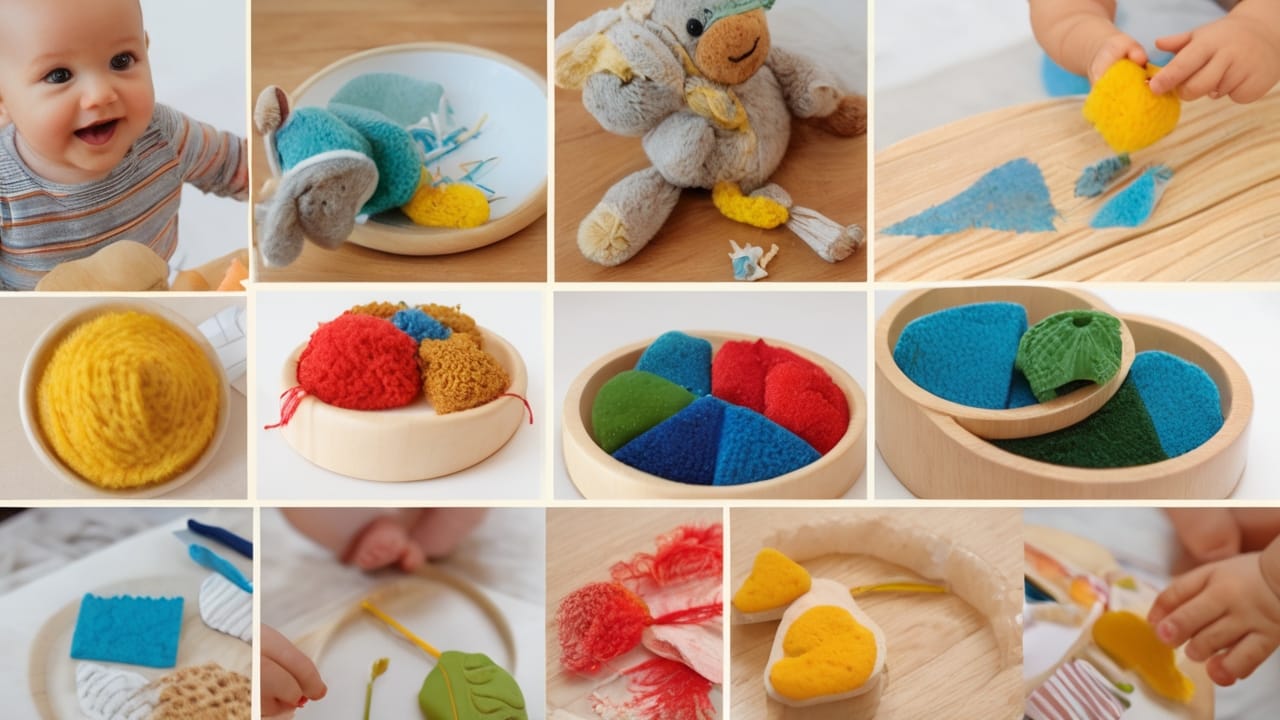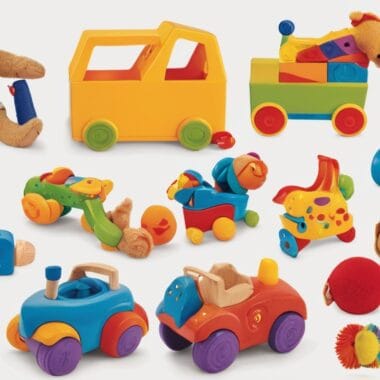-

- Baby playing with Montessori toys in a minimalist room designed to encourage physical development through exploration and play
-

- Collection of must-have Montessori toys like wooden stacking rings and shape sorters for activities to encourage physical development in infants.
-

- DIY Montessori sensory board and homemade fabric balls to support activities to encourage physical development in infants.
-

- Parent ensuring safe play with Montessori toys, creating a secure environment for activities to encourage physical development in infants.
As parents, we all want the best for our babies, especially when it comes to their development and well-being. That’s why Montessori-inspired activities are a fantastic choice for infants under one year old. These activities are designed to encourage independence, promote learning, and support emotional growth. Using Montessori principles, we can create a nurturing environment filled with activities to encourage physical development in infants, helping them grow into curious, confident, and well-rounded individuals.
In this post, we’ll explore engaging sensory play ideas, motor skill development activities, language-building techniques, and ways to foster emotional intelligence, all tailored specifically for babies under one year. So, let’s dive into these enriching activities to encourage physical development in infants and set the stage for a lifelong love of learning!
Sensory Play Ideas: Engaging Activities That Stimulate the Baby’s Senses
Sensory play is an integral part of early childhood development, especially in a Montessori-inspired setting. For infants under one year, sensory play activities are perfect for stimulating their senses and promoting cognitive growth. These activities to encourage physical development in infants are designed to engage their sense of touch, sight, hearing, taste, and smell, helping them explore the world around them in a safe and engaging way.
One simple yet effective sensory activity is a “sensory basket.” Fill a small, shallow basket with various textured items, such as a soft cloth, a wooden block, a smooth stone, and a piece of natural sponge. As your baby explores these items with their hands and mouth, they learn about different textures, shapes, and weights. This kind of hands-on exploration is one of the best activities to encourage physical development in infants because it promotes fine motor skills and sensory awareness.
The Power of Sensory Bottles
Sensory bottles are another fantastic Montessori-inspired activity for babies under one year. These bottles can be filled with various materials such as water, oil, glitter, beads, or small toys. When shaken, the bottles create different sounds and visual effects, capturing your baby’s attention and stimulating their auditory and visual senses. This simple DIY project is a great example of activities to encourage physical development in infants, as it helps develop hand-eye coordination and grasping skills.
By engaging in sensory play, babies learn to process and interpret the information they receive from their senses. This foundational skill is crucial for their overall cognitive development and prepares them for more complex activities to encourage physical development in infants as they grow older.
Motor Skill Development Activities: Simple Exercises and Toys to Enhance Fine and Gross Motor Skills
Motor skill development is a key focus in Montessori-inspired activities for babies. Developing both fine and gross motor skills is essential for infants under one year, as these skills lay the groundwork for later physical and cognitive milestones. To support these activities to encourage physical development in infants, Montessori methods emphasize using simple exercises and toys that promote natural movement and coordination.
For fine motor skill development, consider using toys like wooden rings, stacking cups, or soft cloth balls. These toys encourage your baby to grasp, release, and manipulate objects, strengthening their hand muscles and improving hand-eye coordination. Playing with these toys regularly is one of the most effective activities to encourage physical development in infants, helping them develop the dexterity they’ll need for future tasks like feeding themselves or picking up small objects.
Tummy Time and Its Benefits
Tummy time is a classic but crucial activity for building gross motor skills in infants. During tummy time, babies are placed on their stomachs, which encourages them to lift their heads, strengthen their neck and back muscles, and eventually push up with their arms. This exercise is fundamental to preparing them for crawling, sitting, and walking. Tummy time sessions should be short but frequent, making it one of the most beneficial activities to encourage physical development in infants. To keep tummy time engaging, use a colorful, textured mat or place a mirror in front of your baby so they can see their reflection, adding an element of sensory exploration.
Incorporating motor skill development activities into your baby’s daily routine doesn’t require expensive equipment or complicated setups. The key is to provide opportunities for movement and exploration, fostering natural development through activities to encourage physical development in infants.
Language Development Through Play: Using Montessori Methods to Encourage Early Language Skills
Language development is another critical area where Montessori-inspired activities can make a significant impact. For babies under one year, language development begins with listening and mimicking sounds. Montessori methods emphasize the importance of engaging with your baby through conversation, singing, and storytelling, all of which are activities to encourage physical development in infants by supporting their cognitive and language growth.
One effective Montessori activity is the “Object and Word” game. Place a few simple objects in front of your baby, such as a ball, spoon, or cup. As you point to each object, clearly say its name and encourage your baby to repeat the sounds. This game not only introduces new vocabulary but also enhances their ability to connect words with physical objects, which is a foundational step in language development. It’s a fun and interactive activity to encourage physical development in infants that also supports early communication skills.
The Role of Books in Language Development
Reading to your baby is another wonderful way to boost language skills. Choose simple, high-contrast board books with large pictures and minimal text. As you read, point to the pictures and describe them, using expressive language and varied tones to keep your baby engaged. This activity helps babies associate words with images and sounds, which is a critical step in developing early literacy skills. Additionally, the physical act of turning pages can be an excellent activity to encourage physical development in infants, as it enhances fine motor skills and hand-eye coordination.
Language development activities in a Montessori setting are all about immersion and engagement. By incorporating these practices into your daily routine, you can help your baby develop strong language skills while also supporting their overall physical and cognitive growth.
Building Emotional Intelligence in Babies: How Montessori Activities Can Support Emotional Growth and Awareness
Emotional intelligence is the ability to understand and manage one’s own emotions, as well as recognize and influence the emotions of others. Developing emotional intelligence in babies under one year may seem early, but Montessori activities are designed to foster this growth from the start. By encouraging activities to encourage physical development in infants that also promote emotional awareness, parents can help their children build a strong foundation for empathy, self-regulation, and social skills.
One Montessori-inspired activity to support emotional growth is the “Mirror Play” game. Place a baby-safe mirror at your baby’s eye level during playtime. Encourage your baby to look at themselves in the mirror, smile, make faces, and observe their expressions. This simple activity helps babies develop self-awareness and recognize their own emotions. It also serves as a sensory activity that supports physical development, making it one of the best activities to encourage physical development in infants.
Encouraging Empathy Through Social Interaction
Social interaction is another critical component of building emotional intelligence. Spend time engaging with your baby face-to-face, mimicking their expressions, and responding to their vocalizations. These interactions help your baby understand cause and effect in social contexts and build trust and attachment, both of which are crucial for emotional development. These moments are more than just bonding; they’re activities to encourage physical development in infants that also promote emotional growth.
Incorporating emotional intelligence-building activities into your baby’s daily routine can help them navigate their emotions and relationships better as they grow. These early experiences are essential for fostering a healthy sense of self and empathy toward others.
Montessori-inspired activities for babies under one year are more than just play—they’re essential tools for nurturing physical, cognitive, emotional, and social development. By focusing on activities to encourage physical development in infants, such as sensory play, motor skill exercises, language-building games, and emotional growth activities, parents can provide a rich, engaging environment that supports their baby’s holistic development. If you’re interested in learning more about incorporating Montessori principles into your daily routine, check out our review of “Farm Animal Night Light Collection” which is designed to complement these activities perfectly without feeling like a pushy purchase.








